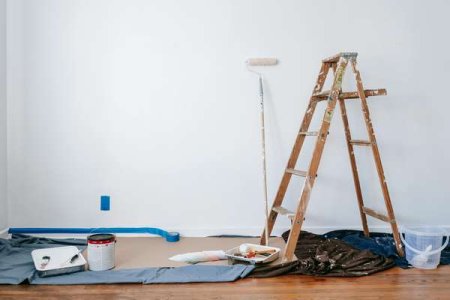Unlock your home upgrade: Discover how to apply for financial assistance today!
By
Aubrey Razon
- Replies 0
As we age, our homes need upgrades to stay safe and comfortable, but the costs can be overwhelming and you might think these improvements are out of reach.
The good news? There are financial assistance programs ready to help you maintain your home affordably!
The U.S. government recognizes the importance of helping retirees and low-income families keep their homes in good repair.
To this end, several programs have been established to provide financial aid for home improvements.
Here's a closer look at some of the key initiatives that could help you transform your living space:
Beyond federal programs, many states and local governments offer additional support.
These programs often focus on ensuring homes meet safety and livability standards
For example, some areas provide grants to help with weatherization or emergency repairs.
To discover what's available in your community, start by contacting your local housing office.
Nonprofit organizations and community groups can also be valuable resources, offering everything from financial guidance to volunteer-led repair services.
When exploring these options, it's essential to understand the eligibility requirements and application processes.
Some programs have income limits or require that you've lived in your home for a certain period.
Others might be geared specifically toward veterans, rural residents, or those with disabilities.
Combining these programs with your Social Security benefits can give you even more financial flexibility.
While Social Security provides a steady income, these home repair programs can alleviate the burden of maintenance costs, allowing you to allocate your funds to other living expenses.
If you're ready to start making improvements to your home, here's how to get the ball rolling:
1. Assess Your Needs: Determine what repairs or upgrades are necessary for your home. Prioritize them based on safety, comfort, and energy efficiency.
2. Research Programs: Use online resources, such as the HUD website, to find programs for which you might be eligible. Don't forget to check with your state and local housing authorities as well.
3. Gather Documentation: Most programs will require proof of income, home ownership, and other personal details. Start collecting necessary documents early to streamline the application process.
4. Seek Expert Advice: Consider consulting with a financial advisor or a housing counselor who specializes in elder care. They can help you navigate the application process and maximize the benefits you receive.
5. Apply: Once you've identified the programs that fit your needs, complete the applications thoroughly and submit them as directed. Keep copies of all your submissions and follow up as needed.
Remember, investing in your home is not just about immediate comfort—it's about protecting your long-term investment.
With the right financial assistance, you can ensure your home remains a haven for years to come. Let's make the most of these opportunities and continue to thrive in our golden years!

Have you successfully applied for home repair assistance? Do you have tips for navigating the application process? Share your experiences and advice in the comments below.
The good news? There are financial assistance programs ready to help you maintain your home affordably!
The U.S. government recognizes the importance of helping retirees and low-income families keep their homes in good repair.
To this end, several programs have been established to provide financial aid for home improvements.
Here's a closer look at some of the key initiatives that could help you transform your living space:
1. Title 1 Loans
These loans are designed to finance home remodeling and repairs. They are a great option if you need to make significant improvements but don't have the upfront cash.2. 203(k) Rehabilitation Loans
If you're buying a home that needs repairs or you want to refinance and remodel your current home, this program allows you to roll the cost of the work into your mortgage, up to $35,000.3. HECM Reverse Mortgage
Homeowners aged 62 and older can tap into their home equity to fund repairs. This option can be particularly useful if you have significant equity in your home but a limited cash flow.4. Energy Assistance Programs
These initiatives help households manage utility costs and can include grants for energy-efficient upgrades, such as insulation or new windows.5. Accessibility Loans
For individuals with reduced mobility, these loans can fund modifications to make a home more accessible, such as installing ramps or widening doorways.Beyond federal programs, many states and local governments offer additional support.
These programs often focus on ensuring homes meet safety and livability standards
For example, some areas provide grants to help with weatherization or emergency repairs.
To discover what's available in your community, start by contacting your local housing office.
Nonprofit organizations and community groups can also be valuable resources, offering everything from financial guidance to volunteer-led repair services.
When exploring these options, it's essential to understand the eligibility requirements and application processes.
Some programs have income limits or require that you've lived in your home for a certain period.
Others might be geared specifically toward veterans, rural residents, or those with disabilities.
Combining these programs with your Social Security benefits can give you even more financial flexibility.
While Social Security provides a steady income, these home repair programs can alleviate the burden of maintenance costs, allowing you to allocate your funds to other living expenses.
If you're ready to start making improvements to your home, here's how to get the ball rolling:
1. Assess Your Needs: Determine what repairs or upgrades are necessary for your home. Prioritize them based on safety, comfort, and energy efficiency.
2. Research Programs: Use online resources, such as the HUD website, to find programs for which you might be eligible. Don't forget to check with your state and local housing authorities as well.
3. Gather Documentation: Most programs will require proof of income, home ownership, and other personal details. Start collecting necessary documents early to streamline the application process.
4. Seek Expert Advice: Consider consulting with a financial advisor or a housing counselor who specializes in elder care. They can help you navigate the application process and maximize the benefits you receive.
5. Apply: Once you've identified the programs that fit your needs, complete the applications thoroughly and submit them as directed. Keep copies of all your submissions and follow up as needed.
Remember, investing in your home is not just about immediate comfort—it's about protecting your long-term investment.
With the right financial assistance, you can ensure your home remains a haven for years to come. Let's make the most of these opportunities and continue to thrive in our golden years!
Key Takeaways
- The U.S. government provides financial assistance programs for home repairs and improvements to help retirees and low-income families.
- These programs include Title 1 Loans, 203(k) Rehabilitation Loans, HECM Reverse Mortgage, Energy Assistance, and Accessibility Loans to cater to various needs.
- Additional support may be available at the state and local level, and beneficiaries are encouraged to seek information on available programs in their communities.
- Combining help from these programs with Social Security benefits can help retirees and low-income families manage their home maintenance expenses without compromising their monthly incomes.







